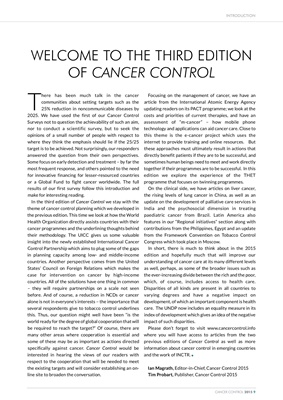
INTRODUCTION
CANCER CONTROL 2015 9
T
here has been much talk in the cancer
communities about setting targets such as the
25% reduction in noncommunicable diseases by
2025. We have used the first of our Cancer Control
Surveys not to question the achievability of such an aim,
nor to conduct a scientific survey, but to seek the
opinions of a small number of people with respect to
where they think the emphasis should lie if the 25/25
target is to be achieved. Not surprisingly, our responders
answered the question from their own perspectives.
Some focus on early detection and treatment - by far the
most frequent response, and others pointed to the need
for innovative financing for lesser-resourced countries
or a Global Fund to fight cancer worldwide. The full
results of our first survey follow this introduction and
make for interesting reading.
In the third edition of Cancer Control we stay with the
theme of cancer control planning which we developed in
the previous edition. This time we look at how the World
Health Organization directly assists countries with their
cancer programmes and the underlining thoughts behind
their methodology. The UICC gives us some valuable
insight into the newly established International Cancer
Control Partnership which aims to plug some of the gaps
in planning capacity among low- and middle-income
countries. Another perspective comes from the United
States' Council on Foreign Relations which makes the
case for intervention on cancer by high-income
countries. All of the solutions have one thing in common
- they will require partnerships on a scale not seen
before. And of course, a reduction in NCDs or cancer
alone is not in everyone's interests - the importance that
several respondents give to tobacco control underlines
this. Thus, our question might well have been "is the
world ready for the degree of global cooperation that will
be required to reach the target?" Of course, there are
many other areas where cooperation is essential and
some of these may be as important as actions directed
specifically against cancer. Cancer Control would be
interested in hearing the views of our readers with
respect to the cooperation that will be needed to meet
the existing targets and will consider establishing an online
site to broaden the conversation.
Focusing on the management of cancer, we have an
article from the International Atomic Energy Agency
updating readers on its PACT programme; we look at the
costs and priorities of current therapies, and have an
assessment of "m-cancer" - how mobile phone
technology and applications can aid cancer care. Close to
this theme is the e-cancer project which uses the
internet to provide training and online resources. But
these approaches must ultimately result in actions that
directly benefit patients if they are to be successful, and
sometimes human beings need to meet and work directly
together if their programmes are to be successful. In this
edition we explore the experience of the THET
programme that focuses on twinning programmes.
On the clinical side, we have articles on liver cancer,
the rising levels of lung cancer in China, as well as an
update on the development of palliative care services in
India and the psychosocial dimension in treating
paediatric cancer from Brazil. Latin America also
features in our "Regional initiatives" section along with
contributions from the Philippines, Egypt and an update
from the Framework Convention on Tobacco Control
Congress which took place in Moscow.
In short, there is much to think about in the 2015
edition and hopefully much that will improve our
understanding of cancer care at its many different levels
as well, perhaps, as some of the broader issues such as
the ever-increasing divide between the rich and the poor,
which, of course, includes access to health care.
Disparities of all kinds are present in all countries to
varying degrees and have a negative impact on
development, of which an important component is health
care. The UNDP now includes an equality measure in its
index of development which gives an idea of the negative
impact of such disparities.
Please don't forget to visit www.cancercontrol.info
where you will have access to articles from the two
previous editions of Cancer Control as well as more
information about cancer control in emerging countries
and the work of INCTR. l
Ian Magrath, Editor-in-Chief, Cancer Control 2015
Tim Probart, Publisher, Cancer Control 2015
WELCOME TO THE THIRD EDITION
OF CANCER CONTROL